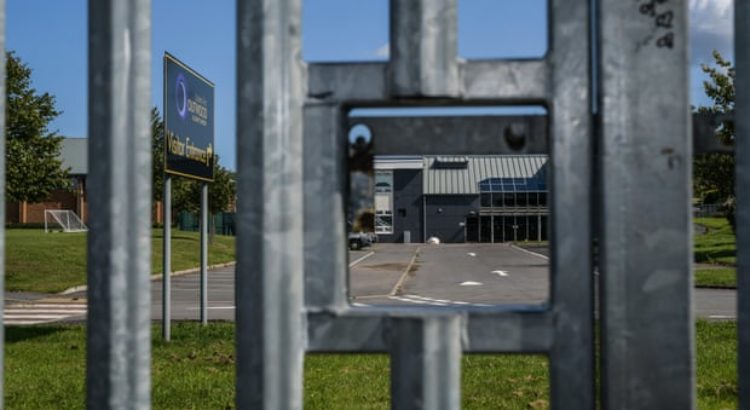By Frances Perraudin and Niamh McIntyre
Call for government to act after Guardian investigation reveals high suspension rates in England
The government has been urged to address “deeply concerning” rates of exclusion in England’s secondary schools after a Guardian investigation revealed dozens had suspended at least one in five of their pupils.
Of those 45 schools handing at least 20% of their pupils one or more fixed-period exclusion in 2016-17, the overwhelming proportion were academies, with one of them, the Outwood academy Ormesby in Middlesbrough, excluding 41%. Five were run by local authorities and six were free schools.
Fixed-period exclusions are when a pupil is formally suspended from school for a set time, usually up to three days. A student may have multiple exclusions in the same year.
Nine of the 45 schools were part of the Outwood Grange academy trust, a multi-academy trust that runs 30 schools across Yorkshire, the Humber and the east Midlands.
The national average of pupils receiving at least one suspension in the last academic year is 4.6%. Outwood academy Ormesby excluded 41% of pupils, giving out 2,405 fixed-period exclusions to 274 pupils in a single year.
Outwood academy Bishopsgarth, a 10-minute drive away in Stockton-on-Tees, had the second highest rate, excluding 34% of pupils last year. This amounted to 1,268 fixed-period exclusions given to 182 pupils.
A spokesman for the trust said it had taken over “some of the toughest schools in England” and repeatedly turned around their performance. He said that in many cases, the schools it had taken over had previously been excluding high numbers of children informally, meaning the increase in the number of official exclusions was misleading.
The trust said pupils at Outwood academy Ormesby had beaten the school’s GCSE record for the last three years and that the school was oversubscribed. It pointed to an Ofsted report that praised the school for “bringing about change and improvement successfully, and at remarkable speed”.
The trust also said Outwood academy Bishopsgarth had seen a 7% increase in what were already record GCSE results this year.
“Fixed-term exclusions are never issued for ‘minor’ incidents, but may result from a student’s poor choice of reaction or response to a reasonable request,” it said.
Angela Rayner, the shadow education secretary, said the fact that some schools were recording such high rates of suspension “should be a matter of huge concern to the government, and to the schools affected”.
Some people believe schools are increasingly “playing” the system – getting rid of students who might do badly in their GCSEs and compromise the school’s performance in league tables.
In June, an Ofsted investigation into the practice of “off-rolling” – where pupils disappear from the school register just before GCSEs – found that more than 19,000 pupils who were in year 10 in 2016 had vanished from the school roll by the start of year 11, the year when pupils sit their GCSEs.
Figures published by the Department for Education last month found that there were more than 40 permanent exclusions a day (total of 7,700) during the 2016-17 school year, compared with a little over 35 a day the previous year. Fixed-term exclusions increased by about 40,000, to a total of 382,000, meaning nearly one in 20 pupils were given a fixed-period exclusion in that school year.
In March the DfE launched a review into school exclusions, led by the former Conservative MP and children’s minister Edward Timpson. The government said the review would “explore how head teachers use exclusion in practice, and why some groups of pupils are more likely to be excluded”, but that it would not examine exclusion powers. It is expected to report by the end of the year.
The launch of the review came after Cathryn Kirby, Ofsted’s regional director for the North East, Yorkshire and the Humber, wrote to secondary headteachers in the region to complain about the high rates of fixed-period.
“Schools should only ever use exclusions as a last resort,” she said. “If not properly applied, being removed from school can disrupt a child’s education and affect their future life chances.”
Secondary schools in Middlesbrough gave the highest number of fixed term exclusions of any local authority area in the last academic year, handing them to 11.67 pupils in 100. Doncaster and Barnsley also excluded more than one in ten pupils from secondary schools.
Yorkshire and the Humber saw the most fixed-term exclusions of any region in the country, with an overall rate of 5.8 per 100 pupils. Inner London had the second highest rate (5.3 in 100) and the north east the third highest (4.9 in 100).
South Leeds Academy, now operating as Cockburn John Charles Academy, came third on the list for rates of fixed-term exclusions, suspending 30% of their pupils in the last academic year. Outwood Academy Shafton, in Barnsley, came fourth, suspending 29.8%, and the Telford Park School in Shropshire, came fifth, suspending 28.1%.
Kevin Courtney, joint general secretary of the National Education Union, said that it was deeply concerning to hear that so many schools were excluding such high numbers of pupils.
“Real-terms funding cuts have forced schools to make behavioural and specialist learning support assistants redundant, many of whom supported pupils at risk of exclusion, including those with special educational needs or disabilities (SEND),” he said. “Alongside this, schools have lost external support because of the funding cuts to local authority specialist support services.
“The reasons for a huge variance in rates of permanent and fixed term exclusions need to be examined carefully. However, it is clear that the competitive and fragmented system produced by the academy reforms encourages schools to compete for the pupils most likely to get high grades and increase exclusions of pupils who may be more challenging to teach.”
A spokesperson for the Department for Education said the decision to exclude should be reasonable and fair, and that permanent exclusion should only ever be used as a last resort. “Statutory guidance also states that schools should consider the underlying causes of poor behaviour before excluding a pupil,” they said.
“While we know that there has been an increase in exclusions there are still fewer than the peak ten years ago. We have launched an externally led review to look at how exclusions are used and why certain groups are disproportionally affected.”
Source of the notice: https://www.theguardian.com/education/2018/aug/31/dozens-of-secondary-schools-exclude-at-least-20-of-pupils







 Users Today : 248
Users Today : 248 Total Users : 35459843
Total Users : 35459843 Views Today : 418
Views Today : 418 Total views : 3418390
Total views : 3418390